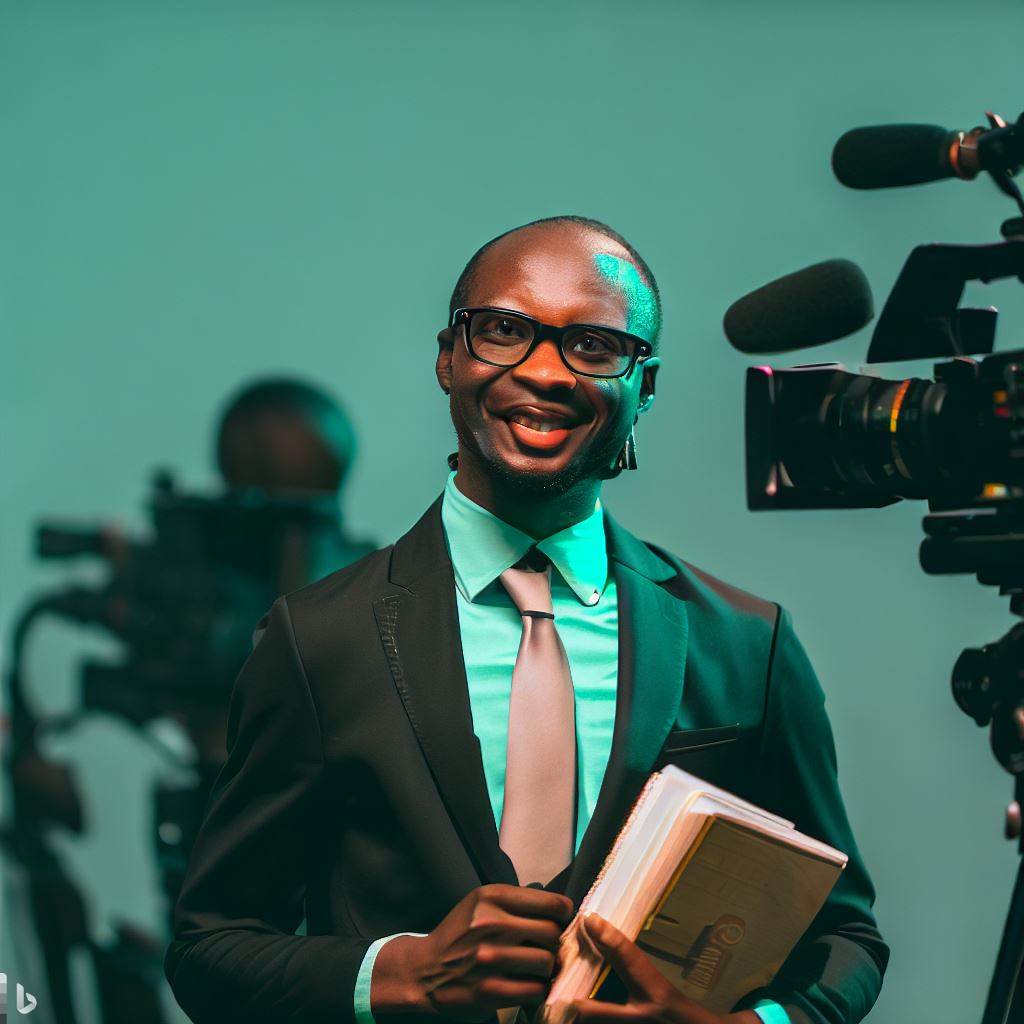Introduction
Television in Nigeria has experienced significant growth over the years, with numerous channels catering to various interests and demographics.
This industry has become an essential source of entertainment, news, and information for millions of Nigerians.
Among the various roles in the television industry, television reporters hold a critical position. They are responsible for gathering and presenting news stories to the public.
Through their reports, they keep the Nigerian population informed about current events, politics, social issues, and more.
This blog post aims to shed light on the daily routine and challenges faced by Nigerian television reporters.
It will provide an insight into the behind-the-scenes work that goes into producing news content for television.
From researching news stories to conducting interviews and presenting on-air, television reporters are always on the go.
As the readers delve deeper into this blog post, they will gain a better understanding of the dedication, hard work, and professionalism required to excel in this dynamic field.
Additionally, it will showcase the importance of a television reporter’s role in shaping public opinion, fostering transparency, and holding authorities accountable.
In the following chapters, we will explore the typical tasks, responsibilities, and experiences of Nigerian television reporters, providing a comprehensive picture of a day in their lives.
Through this, readers will gain a greater appreciation for the work that goes into bringing news and information to their screens.
Morning Routine
Waking up early
Every morning, the Nigerian television reporter rises with the sun, setting the tempo for the day ahead.
Preparing for the day
The reporter brushes aside the drowsiness, freshens up, and gets ready with a quick shower.
Checking news headlines and updates
Before leaving home, the reporter skims through various news sources to stay updated on the latest happenings.
Gathering necessary equipment
In the life of a Nigerian Television Reporter, meticulous preparation is key. Ensuring the camera, microphone, and travel gear are in order is paramount.
For a Nigerian TV reporter, mornings establish the rhythm of a day brimming with news and action. From early awakenings to assembling equipment, their routine underscores dedication. Let’s delve into their morning regimen.
Early rising is vital for a Nigerian TV reporter’s success. They grasp the time and expertise required for effective story coverage. Thus, with the first rays, they awaken resolute.
Post-bedtime, the reporter sheds drowsiness with a brisk shower, rejuvenating their senses for impending challenges. They recognize a clear mind and body enhance performance.
Before setting out, news headlines take a few moments. Staying abreast of current affairs is pivotal. They scour platforms, ensuring no vital updates evade their notice.
Stepping into the world, armed with storytelling tools, the reporter verifies all is impeccable.
Camera, microphone, and essentials must function flawlessly. Batteries, memory cards, and extras undergo scrutiny to forestall technical glitches.
This routine isn’t just physical; it’s mental. Being mentally primed, updated with news, grants insight for approaching stories.
In summation, a Nigerian TV reporter’s morning involves early rises, gear preparation, news checks, and mental readiness. Each step fuels efficiency, anchoring a triumphant day in rapid journalism.
On-Field Assignments
Arrival at the news station
As a Nigerian television reporter, my day begins with arriving at the bustling news station early in the morning.
The office is already buzzing with activity, journalists preparing for the day ahead.
Receiving assignments from the editor
Once I settle at my desk, I meet with the editor to receive my on-field assignments for the day.
The editor briefs me on the latest news stories and the specific topics I will be covering.
Conducting thorough research on the assigned topic
After getting my assignments, I dive into conducting thorough research on the assigned topic.
I browse through online articles, interview experts, and gather all the necessary information to ensure accuracy in my reporting.
Interviewing sources and collecting information
Equipped with my research, I head out with my cameraperson to conduct interviews with various sources related to the assigned topic.
These interviews play a crucial role in bringing diverse perspectives to our viewers.
Filming video footage on location
As a television reporter, capturing visual elements is essential. With my cameraperson, we travel to the location where the news story is unfolding.
We film footage that complements the interviews and provides a comprehensive view of the situation.
Reporting from the scene
Once we have gathered all the necessary information and footage, it’s time to report live from the scene.
Standing in front of the camera, I deliver a clear and concise report, informing viewers about the latest developments.
Updating social media platforms
In today’s digital age, news spreads through social media platforms. As a proactive reporter, I update our news station’s social media accounts with real-time updates and teasers to engage our audience.
Editing video content and writing scripts
Back at the news station, I collaborate with the video editing team to put together compelling video content that aligns with my report.
Simultaneously, I write scripts for upcoming news segments, ensuring accuracy and clarity in the content.
Attending editorial meetings and sharing insights
To maintain a cohesive newsroom, I attend editorial meetings where we discuss the day’s news stories, share insights, and strategize for future coverage.
This collaborative environment allows us to pool our knowledge and expertise.
Submitting the final report
As the day comes to a close, I submit my final report to the editor.
This report incorporates the interviews, visuals, and a well-crafted narrative that captures the essence of the assigned topic.
Reflecting on the day and preparing for tomorrow
Before leaving the news station, I take a moment to reflect on the day’s work.
I consider what went well and what can be improved, making mental notes for future assignments. I then prepare myself for another day of impactful reporting.
Being a Nigerian television reporter is an exhilarating and demanding job. Each day presents new challenges, but the opportunity to inform, educate, and engage with viewers makes it incredibly rewarding.
Newsroom Activities
Returning to the news station
After a long day of reporting on the field, the Nigerian television reporter heads back to the news station.
They are tired but still excited to share their stories with the viewers.
Transferring and organizing collected materials
Upon arrival, the reporter transfers all the recorded videos, photos, and interviews onto their computer.
They meticulously organize the materials to ensure easy access and retrieval when needed.
Collaborating with other reporters and editors
Next, the reporter joins their colleagues in the newsroom, where they discuss and exchange ideas about their news stories.
They brainstorm and share insights to improve the quality and impact of their reporting.
Writing and editing scripts for news segments
In the dynamic world of Nigerian television reporting, crafting impactful news stories involves a meticulous process.
Once the reporter establishes the story’s angle and structure, they meticulously compose the script. The chosen words not only engage the audience but also offer accurate, unbiased information.
Refinement is paramount. After the initial draft, an extensive editing phase hones the content.
Collaborating closely with editors is crucial, as they ensure adherence to broadcast standards and suggest enhancements. This synergy elevates news segment quality and credibility.
The newsroom buzzes with activity, reporters juggling interviews, research, and phone calls. Feedback from experts enhances scripts, preserving the public’s well-informed status.
Fact-checking, a vital duty, ensures the news’ authenticity, upholding the journalist’s commitment to integrity.
Collaboration extends to larger projects and investigative reports, pooling resources for impactful stories.
Continuous engagement yields fresh angles and sources. Attending events and maintaining relationships with sources—government officials, experts—fosters exclusive, in-depth coverage.
Amid approaching broadcast deadlines, reporters collaborate with production teams, facilitating seamless execution.
In the recording studio, the script comes to life. The reporter employs voice, body language, and presentation prowess to captivate the audience effectively.
In the whirlwind life of a Nigerian television reporter, the newsroom is a hub of creativity, dedication, and perpetual motion.
Each reporter strives for accuracy, credibility, and captivating storytelling—cornerstones of their vibrant reporting journey.
Read: The Future of Television Production in Nigeria: An Outlook
Preparing for Live Reporting
Rehearsing cues and introduction
Rehearsing cues and introduction is a crucial step in ensuring a smooth live reporting experience.
As a Nigerian television reporter, I understand the importance of making a great first impression and captivating the audience from the start.
To achieve this, I thoroughly prepare my cues and introduction beforehand. I carefully craft each sentence, making sure they are concise, engaging, and informative.
My goal is to grab the viewers’ attention and provide them with a clear preview of the news segment.
During rehearsals, I practice my intonation and body language to effectively communicate the key points.
By doing so, I am able to create a connection with the audience and maintain their interest throughout the report.
Double-checking technical equipment
Before going live, I double-check all my technical equipment to ensure a seamless broadcast. As a television reporter, I rely on various tools to deliver accurate and high-quality reports.
First, I check my microphone to guarantee that the sound levels are optimal.
Proper audio quality is essential in ensuring that the viewers can clearly hear my voice and understand the information being presented.
Next, I inspect my camera to ensure that it is focused and positioned correctly. This is crucial for capturing clear and visually appealing shots that contribute to the overall professionalism of the broadcast.
Additionally, I check the lighting to make sure it enhances the clarity of the visuals without creating any distractions. Proper lighting helps create a visually appealing environment that keeps the viewers engaged.
Briefing with cameraperson and sound technician
Collaboration with the cameraperson and sound technician is essential for successful live reporting.
Before going on air, I hold a briefing session with both team members to ensure that we are all on the same page.
During this briefing, I discuss the key points I will be covering in my report and the shots I require from the cameraperson.
Clear communication helps to ensure that the cameraperson captures the necessary visuals that complement my narration.
I also consult with the sound technician to ensure that the audio levels are set appropriately.
This collaboration guarantees that my voice is heard clearly and that any additional sound effects or background noise are balanced appropriately.
Ensuring accuracy and fairness in reporting
As a Nigerian television reporter, maintaining accuracy and fairness in my reporting is of utmost importance.
I understand that my role is to provide unbiased and factual information to the viewers.
Before going live, I thoroughly fact-check all the information I will be presenting. I verify the credibility of my sources and cross-reference information to ensure accuracy.
This attention to detail helps me build trust with my audience.
Furthermore, I strive to be fair in my reporting by presenting multiple perspectives on a given topic.
I aim to give a balanced view that allows viewers to form their own opinions based on a variety of informed perspectives.
Publish Your Professional Profile, Business or Brand
Showcase your expertise, gain trust, and boost visibility instantly on Professions.ng.
Publish NowIn short, preparing for live reporting involves rehearsing cues and introduction, double-checking technical equipment, briefing with the cameraperson and sound technician, and ensuring accuracy and fairness in reporting.
These steps are essential for an impactful and successful live reporting experience as a Nigerian television reporter.
Read: Influential TV Producers: Shaping Nigeria’s Television Scene

Live Reporting
Focus on maintaining composure and professionalism
Certainly, here’s the content you provided formatted as a numbered list:
- As a Nigerian television reporter, when live reporting, it is crucial to maintain composure and professionalism throughout.
- Regardless of the situation, it is important to remain calm and composed, presenting the news in a dignified manner.
- Avoid showing personal emotions or biases, as it can affect the credibility of the news being reported.
- By displaying professionalism, the audience will perceive the reporter as reliable and authoritative, enhancing trust.
Communicating effectively with the audience
Certainly, here’s the content you provided formatted as a numbered list:
- Effective communication is key when delivering news to the Nigerian audience.
- The reporter must use clear and concise language, ensuring that the audience understands the information being shared.
- Use gestures and facial expressions to engage the viewers, making the news more relatable and accessible.
- Maintain eye contact with the camera to establish a connection with the audience, making them feel involved.
- Adopt an active tone of voice and incorporate appropriate pauses to emphasize important points.
Delivering news accurately and in a timely manner
Certainly, here’s the content you provided formatted as a numbered list:
- Accuracy is crucial when reporting news, especially during live broadcasts.
- Nigerian television reporters should ensure that they have gathered reliable information from trustworthy sources.
- Verify facts before delivering the news to prevent spreading misinformation or causing panic among the audience.
- Be aware of the ongoing events and make sure to report recent and relevant news, keeping the audience up-to-date.
Adapting to unexpected situations during live broadcasts
- Television production in Nigeria has experienced significant growth in recent years.
- The industry is characterized by a high demand for local content, which has led to the emergence of numerous television stations and production companies.
- Nollywood, the Nigerian film industry, has also influenced television production, with many filmmakers venturing into television series production.
- Despite these advances, the sector still faces challenges such as inadequate funding and outdated infrastructure.
In fact, being a Nigerian television reporter requires maintaining composure and professionalism, communicating effectively with the audience, delivering news accurately and in a timely manner, and adapting to unexpected situations during live broadcasts.
By upholding these principles, reporters can effectively serve their audience and contribute to the credibility and trustworthiness of the news industry in Nigeria.
Read: Ethics and Responsibilities of a TV Producer in Nigeria
Post-Reporting Responsibilities
Following up on news stories if necessary
After finishing the on-air segment, the Nigerian television reporter’s work is far from over.
They have to ensure that there is complete follow-up on the news stories they covered. This includes gaining more information or updates about the situation.
The reporter may have to get in touch with eyewitnesses, experts, or authorities to gather additional details or clarifications. This step is crucial to provide accurate and up-to-date news to the viewers.
Compiling additional footage or interviews
To enhance the news coverage, television reporters in Nigeria need to gather supplementary material. This could involve collecting more footage related to the story or conducting additional interviews.
They might have to revisit the location of the news event to capture related scenes or visuals.
Additionally, they may need to interview other individuals who have insights or perspectives that would enrich the overall understanding of the story.
Editing video segments and preparing for airing
Once the additional footage and interviews are acquired, the television reporter moves on to the editing phase. They carefully select the best video segments that effectively communicate the story’s essence.
Using their editing skills, they trim unnecessary elements, arrange the chosen shots in a logical sequence, and add necessary captions or graphics.
This process ensures that the final news package is compelling and visually engaging for the audience.
Collaborating with the editing team to finalize news packages
To create a cohesive news package, Nigerian television reporters collaborate closely with the editing team. They work hand in hand to refine the final product before it goes on air.
This collaboration involves sharing ideas, discussing the most impactful shots, and making sure the editing team highlights the key messages effectively.
Together, they refine the pacing, transitions, and overall flow of the news package to ensure its effectiveness.
The television reporter’s active involvement guarantees that the vision they had while reporting is maintained throughout the editing process.
It ensures the news package aligns with their intended narrative style and accurately represents the story they witnessed.
In essence, the post-reporting responsibilities of a Nigerian television reporter are crucial for delivering accurate, comprehensive, and visually appealing news to the viewers.
Following up on news stories, compiling additional footage and interviews, editing videos, and collaborating with the editing team are all integral parts of their role in the news production process.
These responsibilities require meticulous attention to detail and effective teamwork to create impactful news packages.
Read: The Intersection of Culture and TV Production in Nigeria
Journalistic Challenges
Handling sensitive and controversial topics
Being a Nigerian television reporter comes with its fair share of challenges. One of the most significant challenges is navigating sensitive and controversial topics during reporting.
As a journalist, it is crucial to present unbiased and factual information while covering sensitive subjects.
However, when dealing with controversial topics, emotions often run high, and it becomes challenging to stay objective.
Despite these challenges, it is essential for television reporters to maintain their professionalism and adhere to ethical guidelines.
They must conduct thorough research, gather all viewpoints, and present the information accurately.
Moreover, journalists must develop strong communication skills to handle interviews and conversations surrounding sensitive topics.
They must ask the right questions while being respectful and empathetic towards the interviewees.
While covering sensitive subjects, journalists also need to be aware of the potential consequences their reporting might have.
It is their responsibility to consider the potential impact on individuals, communities, and society as a whole.
Balancing personal safety while reporting in difficult areas
Another challenge faced by Nigerian television reporters is ensuring personal safety while reporting in difficult and sometimes dangerous areas.
Journalists often find themselves in the midst of political unrest, protests, or conflict zones while seeking to report on important events.
They must be prepared to face potential risks and prioritize their safety.
To ensure personal safety, reporters undergo rigorous training and equip themselves with knowledge and skills on risk assessment and mitigation.
They learn techniques to navigate dangerous situations and protect themselves from harm.
Furthermore, journalists also rely on close coordination with security personnel and fellow team members to ensure a safe reporting environment.
It is essential for reporters to communicate their whereabouts, follow safety protocols, and have access to protective gear if necessary.
Dealing with time pressures and tight deadlines
Time pressure and tight deadlines pose another significant challenge for Nigerian television reporters.
In the fast-paced world of journalism, reporters often find themselves working against the clock to produce timely and accurate news stories.
Reporters must gather facts, conduct interviews, write scripts, and ensure high-quality visuals in a limited time frame.
This requires outstanding organizational skills, the ability to multitask, and the capacity to work efficiently under pressure.
To meet tight deadlines, reporters must prioritize tasks, delegate responsibilities if working in a team, and make quick yet accurate decisions.
They must remain focused and maintain a sense of urgency throughout the reporting process.
Additionally, journalists need to be adaptable and flexible, as stories can evolve rapidly. They must be prepared to adjust their plans and respond to last-minute changes effectively.
In general, Nigerian television reporters face various challenges in their day-to-day work.
These challenges include handling sensitive and controversial topics, balancing personal safety in difficult areas, and dealing with time pressures and tight deadlines.
Despite these obstacles, dedicated journalists strive to overcome them and deliver news that informs and engages the public.
You Might Also Like: The Landscape of Television Production in Nigeria Today
Conclusion
A Nigerian television reporter’s daily routine is a busy and demanding one.
From the early morning news meetings to late-night broadcasts, their work is filled with challenges and responsibilities.
We appreciate their dedication and hard work in bringing us the latest news and stories from around the country.
Their role in the media industry is crucial, as they provide the public with valuable information and help shape public opinion.
For aspiring television reporters, this blog chapter has hopefully provided insight into the life of a Nigerian television reporter and inspired them to pursue their dreams in this field.
With passion, determination, and perseverance, they too can contribute to the media industry and make a difference in the world through their reporting.




